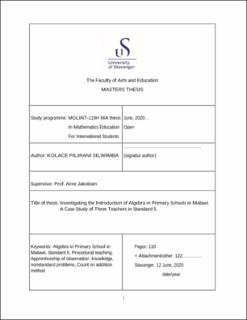| dc.contributor.advisor | Jakobsen, Arne, Prof. | |
| dc.contributor.author | Silwimba, Kolace | |
| dc.coverage.spatial | Malawi | en_US |
| dc.date.accessioned | 2020-10-20T13:15:32Z | |
| dc.date.available | 2020-10-20T13:15:32Z | |
| dc.date.issued | 2020-06-12 | |
| dc.identifier.uri | https://hdl.handle.net/11250/2683952 | |
| dc.description | Master's thesis in Mathematics Education for International Students | en_US |
| dc.description.abstract | Students in Malawi perform very poorly in secondary school mathematics, and algebra in particular. This has prompted the government of Malawi to introduce algebra as topics in the upper primary school curriculum. The aim was to equip learners with algebraic knowledge and skills that can give them a better background for later algebra learning in secondary school. However, much as the introduction of algebra in upper primary school seems to be a solution to learners’ poor performance in secondary school algebra, there is a need to find out how primary teachers teach this algebra. Therefore, the main goal of this study is to investigate the introduction of algebra in primary schools in Malawi. The study aims at finding out how teachers introduce algebra to primary schools in Malawi, particularly in Standard (grade) 5 where algebra is introduced for the first time as a topic. Using the Mathematical Discourse in Instruction framework, the study was guided by the main research question “How do teachers introduce algebra to Standard 5 learners in Malawi?” The study sample comprised of three Standard 5 mathematics teachers from three primary schools in the rural area of central Malawi. The study is a qualitative research study which used lesson observations, document analysis (lesson plans) and interviews of the teachers as methods of data collection. Video and audio recordings were also used to obtain rich data. The study findings reveal that the three teachers who took part in the study lacked sufficient knowledge on how to introduce algebra to Standard 5 learners. They used a traditional “fruit salad” approach of introducing algebra. The examples and tasks selected by the teachers and provided for learners were of the same type, with only one form of variation. The teachers’ word use was found to be non-mathematical, for example, algebraic letters were introduced as names of objects. It was also established that the teachers depend on teachers’ guide and learners’ books for information about how to teach, so, lack of information in textbooks was a challenge for teachers. Basing on the findings, the study concludes that it might be that the teachers have insufficient knowledge on what resources, examples and tasks to use when introducing algebra to beginners. They also expressed weaknesses on how to involve learners in the lessons so that collaborative learning is promoted, and they showed to have inadequate knowledge on how to explain the algebraic concepts to learners to achieve the object of learning. | en_US |
| dc.language.iso | eng | en_US |
| dc.publisher | University of Stavanger, Norway | en_US |
| dc.relation.ispartofseries | Masteroppgave/UIS-HF-IGIS/2020; | |
| dc.subject | algebra in primary schools | en_US |
| dc.subject | standard 5 | en_US |
| dc.subject | matematikkdidaktikk | en_US |
| dc.subject | procedural teaching | en_US |
| dc.subject | nonstandard problems | en_US |
| dc.subject | count on addition method | en_US |
| dc.title | Investigating the introduction of algebra in primary schools in Malawi: A case study of three teachers in standard 5 | en_US |
| dc.type | Master thesis | en_US |
| dc.subject.nsi | VDP::Samfunnsvitenskap: 200::Pedagogiske fag: 280::Fagdidaktikk: 283 | en_US |
